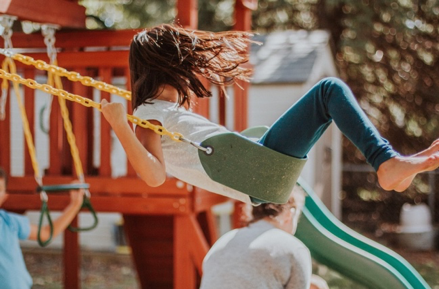
With the weather warming up, it’s only a matter of time before your kids are ready to take their imaginations outdoors. Playing outside not only helps children grow physically strong, but it also improves fine motor skills, sensory skills, and attention spans. However, before you shoo them out the door for some fresh air, ensure you’re doing everything you can to keep your children safe while they’re playing outside.
Examine the Play Area
Whether at a public park or in the backyard, make sure the ground is free of sharp rocks or sticks, broken glass, and animal feces. Inspect the play equipment, checking for rusted, splintered, or otherwise broken equipment. Avoid contact burns on hot days by testing the plastic or metal surfaces before your child starts to play, and avoid playing on wet equipment to keep them from slipping.
Don’t Leave Children Unattended
One of the best ways to protect your children is to keep them within your sight. At a certain age, of course, they’ll be able to play outside alone, but that depends on several factors, like whether or not your yard is fenced, your child’s maturity level, and if they have an older sibling or playmate with them. As they get older, continue to maintain boundaries by setting a curfew and limits on how far they can play from the house.
Reexamine Stranger Danger
Abduction is the fear at the heart of many parent who hesitate to let their children play outside. While the concept of “stranger danger” has the best intentions, it overlooks a few important factors when it comes to protecting children. Defining a “stranger” can be confusing, especially for outgoing children looking to make friends, and it ignores the fact that some strangers can and will help your child in an emergency situation.
Additionally, placing the majority of the blame for childhood abductions on “strangers” isn’t factually accurate. When truly abducted, most children are taken by someone the family knows—only 25% are taken by complete strangers. Instead, teach children to pay attention to the adult’s behavior and watch for warning signs that make them uncomfortable or scared. If they’re old enough to play unsupervised, remind them they’re not allowed to leave the play area without your permission, even if it’s a neighbor asking them to go.
Teach Road Safety
Especially if your yard isn’t fenced in, teach your children not to play on or near the street. If their toys roll onto the road, make it clear they need to get an adult to help retrieve them. As they grow, teach them the basics of road safety: traffic light meanings, using crosswalks to cross safely, and looking both ways.
Teach Proper Equipment Usage
Misuse of playground equipment is one of the largest potential causes of accidents. Make sure your kids are using the equipment the way it was intended; they shouldn’t be climbing up slides, over monkey bar, or outside of the guardrails.
One of the best ways to minimize potential harm to your children is to be prepared with life-saving skills in case of an emergency. Always pack an emergency first aid kit when supervising playing children, and check out the pediatric CPR and first aid classes offered by the team at Specialized Health and Safety.

